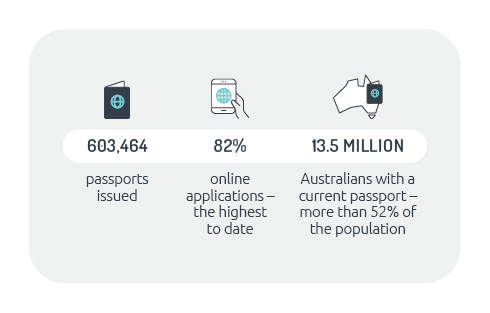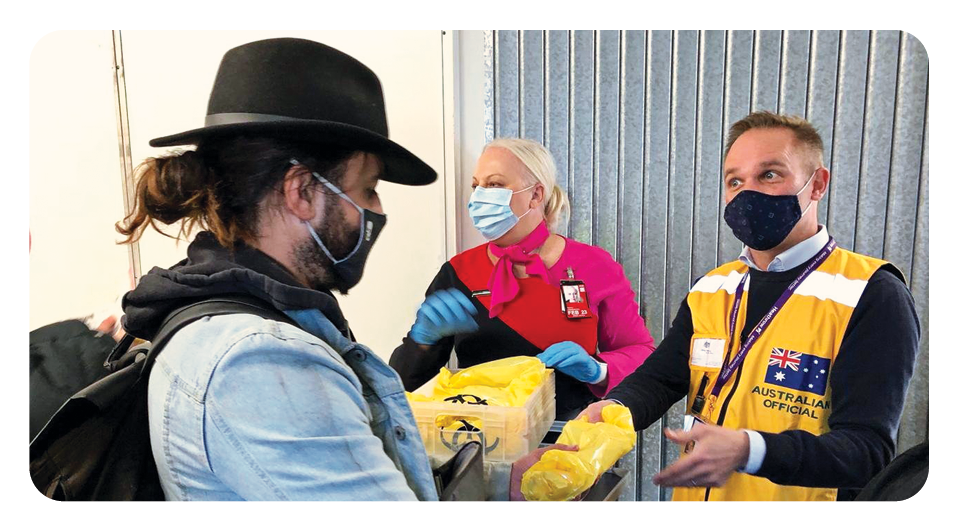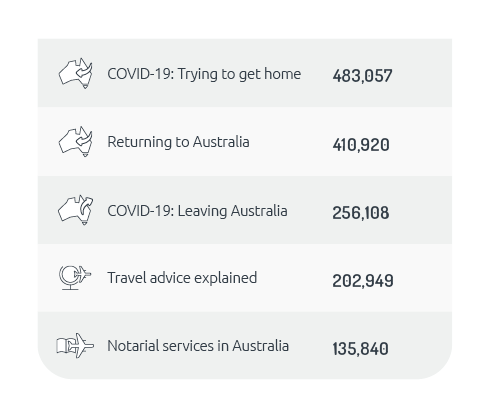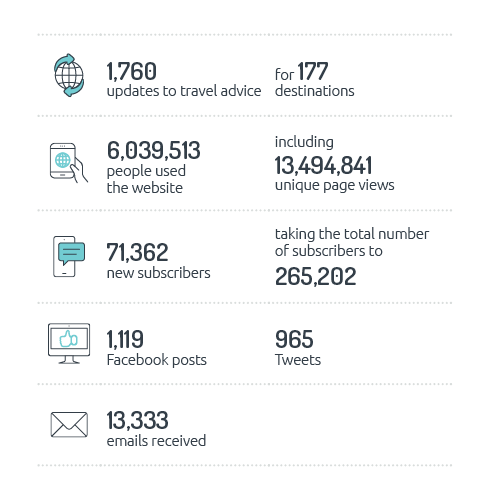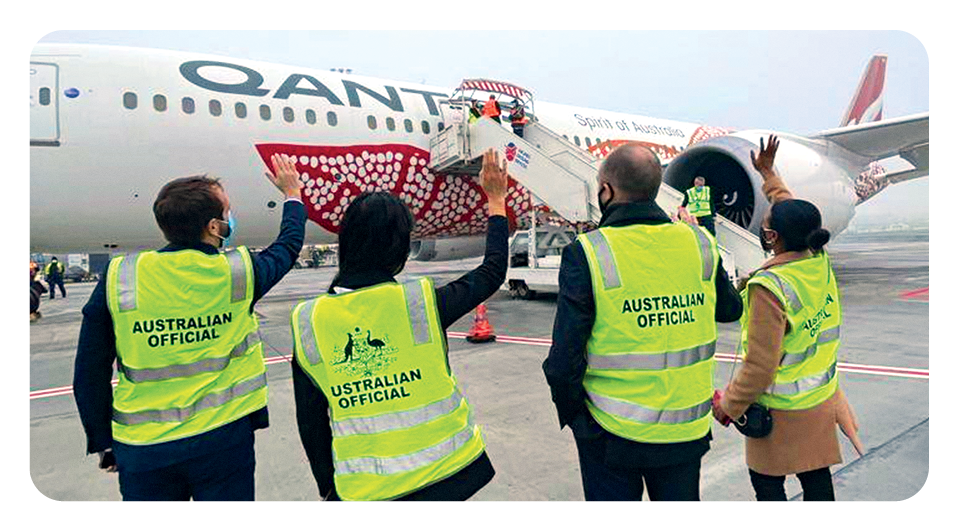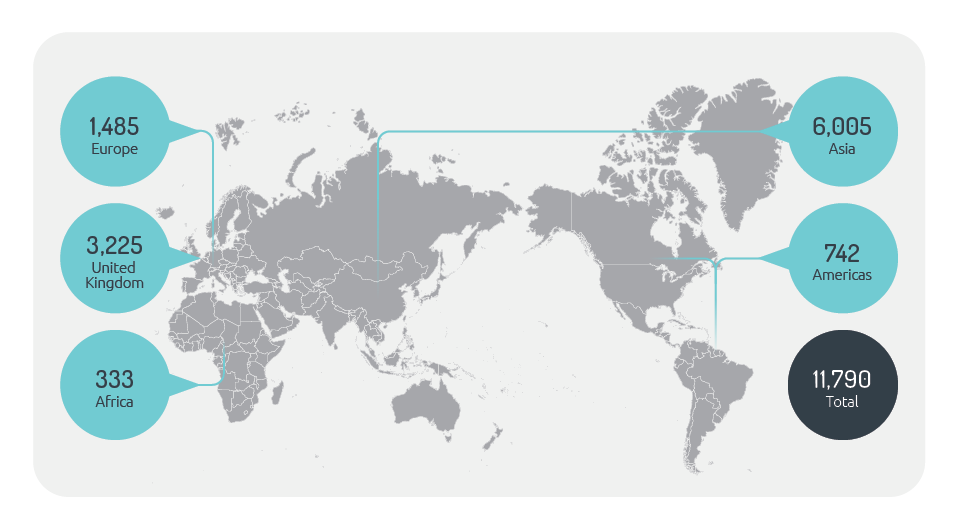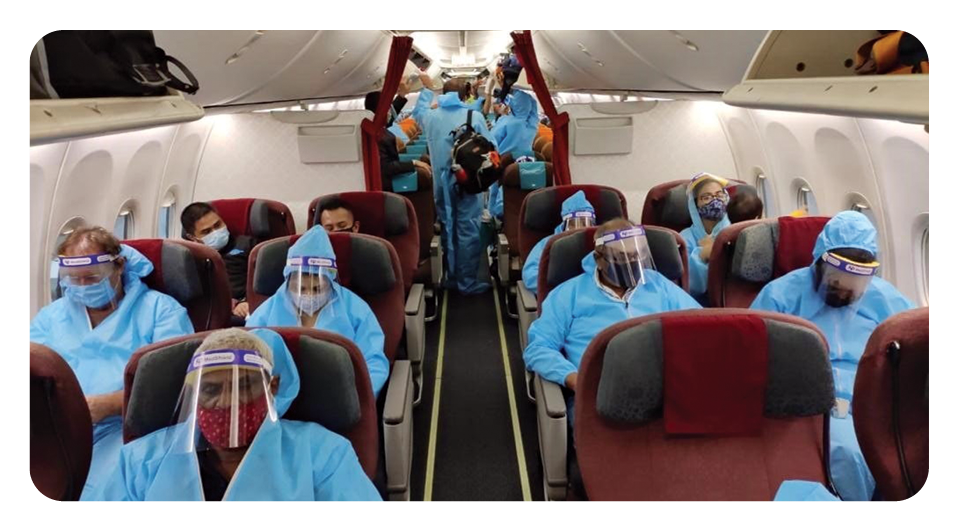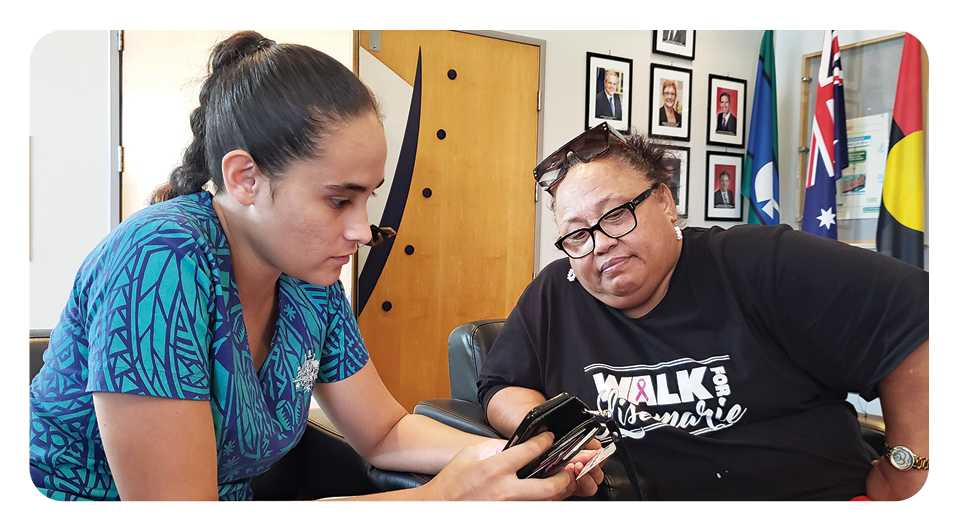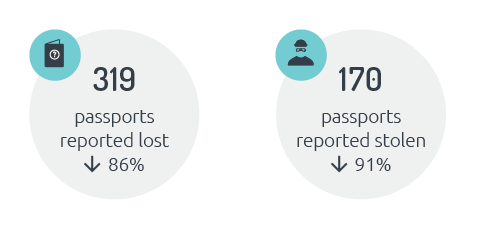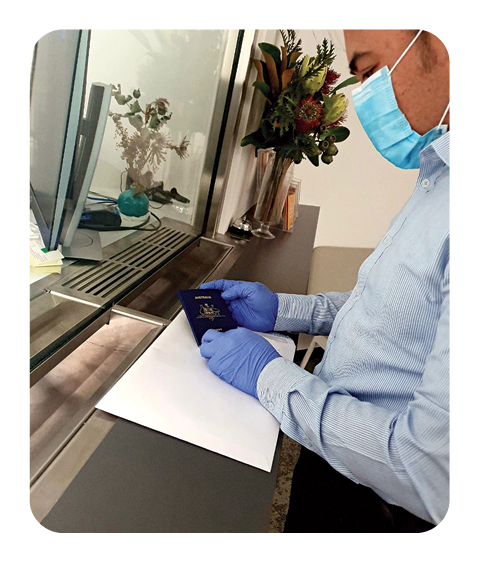Download publication
Consular State of Play 2020–21 [PDF 12 MB]
Consular State of Play 2020-21 Snapshot infographic [PDF 2.3 MB]
Contents
- Foreword
- Our Consular Services
- Overseas Departures
- Travel Advice and Information
- Our COVID-19 Response
- Other Major Incidents
- Consular Cases
- Publication details
Foreword
Senator The Hon Marise Payne, former Minister for Foreign Affairs, former Minister for Women
As a diverse and multicultural nation, Australia's international connections are an integral part of who we are. The past 18 months have been difficult in many ways, including the constraints imposed on the natural tendency of Australians to look and travel beyond our shores.
However, one of the many benefits of Australians' readiness to be vaccinated in world-leading numbers is that we can now reconnect with people and places we love. As we chart a course out of the pandemic, we have been reopening our international borders to maximise the number of Australians who can return, and also reviving our love of overseas travel – albeit in a very different world.
International travel is resuming, but it is still unpredictable. Keeping Australians safe overseas and providing a high-quality consular service remains one of the government's highest priorities. Our consular support and advice is aimed at preparing Australians for the new challenges of travel and continuing to focus support on those most in need.
Even before the pandemic, the complexities around Australians travelling overseas and requiring consular assistance were growing. With the emergence of COVID-19, the Department of Foreign Affairs and Trade (DFAT) expanded its consular work to support Australians in very challenging circumstances.
In 2020–21, we provided assistance to more than 38,700 Australians overseas, with the mix of cases showing increased complexity as we undertook the largest consular effort in our nation's history.
During the pandemic, with the support of our government and industry partners, we have supported over 60,000 Australians across the globe to return, including more than 30,000 on well over 200 government-facilitated commercial flights. These flights have operated from a number of hubs including London, Singapore, New Delhi, Frankfurt, Islamabad, Johannesburg, Istanbul and Buenos Aires.
We have also provided $41 million of financial support to 5,400 people in financial distress due to the pandemic.
In 2020-21 we responded to the increasing demands for travel advice with some 1,760 updates to travel advisories. DFAT's Consular Emergency Centre took 54,000 calls and over 13,000 email enquiries to Smartraveller. We connected with thousands of Australians and families through our social media channels across the diplomatic network.
This substantial effort is captured in DFAT's Consular State of Play 2020–21 – an annual statistical snapshot of our consular services. It shows the increased scale and complexity of the department's work for Australians abroad during COVID-19 and offers insight into the significant consular response.
In delivering consular services for Australians in need, the department continues to draw on critical partnerships, overseas and in Australia. I commend the work of my department in supporting Australians overseas.
Year in review
In a complex and challenging travel environment, we continued to respond to significant demand for our consular services in 2020–21.
We provided assistance to more than 38,780 Australians in difficulty overseas. This included 15,411 cases of consular assistance, up from 14,513 cases in 2019–20 and 13,707 cases in 2018–19.
We broke new ground in consular services by establishing a program of government facilitated commercial flights, supporting more than 23,300 Australian citizens and permanent residents to return to Australia.
We maintained core services while managing the significant COVID-19 consular response. With fewer Australians travelling, there was a drop in non-COVID related consular cases such as thefts and assaults. However, our work on existing complex consular cases continued, including the detention and release of an Australian in Iran and other resource-intensive cases such as kidnappings and clients facing the death penalty.
Our consular officers across the globe adapted to the increased workload and more complex cases by implementing flexible and creative solutions.
We introduced surge staffing, drawing on other government agencies, to bolster our consular response. We expanded consular partnerships with overseas governments, authorities and industry to assist our delivery. And we invested in technical solutions, such as video links for virtual prison visits and passport interviews, so officials could keep providing consular services in a restrictive global setting.
We are building on these efforts by modernising our consular services to ensure we continue to deliver a world-class consular service for Australian citizens, particularly during crises.
Consular State of Play
The Consular State of Play is an annual statistical snapshot of our consular assistance. While most cases in this report occurred in 2020–21, some remain open from previous years. Additionally, while the COVID-19 pandemic began in early 2020, statistics in this report are for the period 1 July 2020 to 30 June 2021.
Our Consular Services
Through our diplomatic network and Consular Emergency Centre in Canberra, we provide support to Australians who encounter difficulties overseas. This might be because of a major crisis or emergency, an accident, illness or crime.
Our staff draw on their understanding of local operating environments and broad diplomatic networks to provide assistance in person, over the phone and online.
The consular services we provide to Australians overseas are not a legal right and travellers shouldn’t assume assistance can be provided. In some circumstances, the assistance we can provide may be limited, for example if someone has been reckless or acted illegally, or if you are dual national in your country of other nationality.
We prioritise cases involving those most vulnerable, including children, victims of assault or people who are less able to help themselves.
Our Consular network
Consular Services Charter
Our Consular Services Charter describes what we can and can’t do to help Australians overseas, including in a crisis. It explains our expectations of Australian travellers, such as taking personal responsibility for travel choices, safety and behaviour, reading our travel advice before going overseas, and having appropriate travel insurance.
Overseas departures
With the overseas travel ban in place there was a significant decrease in departures from Australia.
The number of Australian resident departures was 329,742 in 2020-21, down from nearly 8.3 million last year and 11.8 million in 2018–19. The majority of these travellers (58%) were aged between 25 and 54.
Due to the travel ban, there were no departures via cruise ships.
Age of Travellers
| 0-4 | 16,481 | 5% |
|---|---|---|
| 5-14 | 20,607 | 6% |
| 15-24 | 29,764 | 9% |
| 35-44 | 71,307 | 22% |
| 35-44 | 63,700 | 19% |
| 45-54 | 57,187 | 17% |
| 55-64 | 46,287 | 14% |
| 65+ | 24,409 | 7% |
Passport applications
Passport demand was affected significantly by COVID-19 and remained low throughout 2020–21.There was a 65% drop in passports issued, down from 1,745,340 in 2019–20 to 603,464 in 2020–21. There was also a 22% drop in passport applications to Australia’s overseas missions.
The top 2 countries for overseas passport applications were the United States (16%) and China (13%).
Australia — New Zealand Travel Zone
On 2 October 2020, the Australian Government announced the establishment of a one-way safe travel zone with New Zealand. This allowed passengers from New Zealand to travel to Australia, quarantine-free, starting on 16 October 2020.
On 22 March 2021, an exemption to the overseas travel ban for New Zealand came into effect, allowing Australians to travel to New Zealand. On 19 April 2021, New Zealand removed the quarantine requirement for eligible travellers from Australia, establishing two-way quarantine free travel.
By the end of June 2021, this arrangement had facilitated more than 80,000 Australian citizens and permanent residents to travel to New Zealand and 70,000 arrivals into Australia.
Travel advice and information
The Government maintained its global ‘Do not travel’ advisory during 2020-21 due to the health risks of COVID-19 and significant disruption to global travel.
In a fluid travel environment, we published 1,760 updates to our travel advice for 177 destinations, compared with an average of 700 each year pre-COVID.
We developed a dedicated COVID-19 portal on our Smartraveller website to ensure Australians were kept up to date with the latest information, particularly those overseas.
More than 6 million people accessed the website. We gained more than 71,000 subscribers taking the total to over 265,000. We published more than 1,100 Smartraveller Facebook posts, and tweeted more than 960 times.
Through our Smartraveller website, social media channels and paid advertising, we provide information on travel restrictions, risks and requirements to ensure Australians are aware of the latest advice and, if overseas, prepared for safe travel.
Top Smartraveller website page views
If you can’t afford insurance, you can’t afford to travel
Travel doesn’t always go as planned. If you’re going overseas, travel insurance is as important as a passport. Without it, you or your family could suffer financially if things go wrong. No matter who you are, where you’re going and what you’re doing, get insurance.
For more information see the CHOICE travel insurance buying guide: COVID-19 edition on Smartraveller.gov.au
Smartraveller in numbers
Our COVID-19 response
Our consular response to the global pandemic is the largest and most complex in our history.
In 2020–21 we assisted more than 30,000 Australian citizens and permanent residents overseas affected by COVID-19. This included cases of hospitalisation, financial distress and assistance to return.
Under our Consular Services Charter we only provide consular services to Australian permanent residents in the event of a crisis overseas. During COVID-19 we extended our support to assist Australian permanent residents to return to Australia.
Our COVID-19 response
Assisting Australians to return
We directly assisted more than 23,300 Australian citizens and permanent residents to return from across the globe, including more than 4,500 vulnerable Australians.
Our Regional Consular Officers, located in key posts around the world, also worked with commercial airlines, foreign governments and Australian state and territory authorities to assist vulnerable Australian citizens, permanent residents and their families, to return to Australia on regular commercial flights.
Australian citizens and permanent residents seeking to return provided details on their location and situation in our COVID registration portal. This information assisted us to prioritise the destinations for our government facilitated commercial flights based on where there was a greater need, with a focus on vulnerability and lack of availability of commercial flight options.
Over the year, the registration number changed regularly according to people’s circumstances. In July 2020, there were 15,500 registrations and at 30 June 2021 there were 34,611.
Passengers on government facilitated commercial flights in 2020-21
Special financial assistance
We introduced the Special Overseas Hardship Program to assist Australians in financial distress due to COVID-19. Through this program, we assisted more than 4,500 vulnerable Australians with financial assistance. This included repatriation loans to help cover the cost of return flights to Australia and emergency living costs loans to help cover the cost of safe, temporary accommodation while waiting for flights.
India COVID-19 response
Australia’s High Commission and consulates in India worked with a dedicated consular team in Canberra to help more than 16,000 Australians, permanent residents and their families return to Australia. This included more than 5,700 on 37 government facilitated commercial flights. We also committed $3.1 million in emergency financial assistance for the most vulnerable Australian citizens in India through the Special Overseas Hardship Program.
Through our overseas posts and the Government’s strong partnership with airlines, we arranged 80 government facilitated commercial flights for more than 11,700 Australians.
Other major incidents
In addition to our COVID-19 response, we led the Australian Government’s response to other critical events and crisis incidents during the year.
This included the major explosions at Beirut’s port, the COVID-19 outbreak in Papua New Guinea, Tropical Cyclone Yasa in Fiji, the Myanmar coup, and the May 2021 violence in Israel and the Palestinian Territories. We also provided support during the detention and release of an Australian in Iran and in other complex cases such as kidnappings.
For incidents such as major accidents, natural disasters, or terrorist attacks, our support could include sending expert Crisis Response Teams to assist affected Australians, liaising with families or working with local authorities.
We used our range of crisis response capabilities throughout the year. We activated our Emergency Call Unit in response to the COVID-19 pandemic and other incidents. We also sent members of our Crisis Response Team from Canberra to supplement the response in both Beirut and Papua New Guinea.
Beirut Explosions
Following the devastating Beirut Port explosions on 4 August 2020, staff at the Australian Embassy in Beirut worked with 20 DFAT officers deployed from the region and Australia, and consular staff in Canberra, to assist 79 Australians and their families directly affected by the explosion. Due to the extensive damage to the Australian Embassy, staff worked offsite to ensure critical consular and passport services to Australians could continue. They also assisted more than 300 Australians and permanent residents to access flights to return to Australia.
What to do if you need support urgently
The Consular Emergency Centre is available 24/7 to Australians overseas seeking emergency consular assistance. The centre also connects Australians overseas to specialist counselling services for urgent support, including Lifeline, Rape Crisis Centre and sexual assault counselling services. You can also contact your nearest Australian embassy, high commission or consulate to discuss counselling hotlines and services available in your location.
+61 2 6261 3305 from overseas
1300 555 135 within Australia
Consular cases
When consular officials provide assistance to an Australian experiencing difficulty overseas, they open a case in DFAT’s consular information system.
Every case is different — some can be sorted out relatively quickly, whereas others may take weeks, months or even years to resolve.
This section records the number of consular cases we managed over the 2020-21 financial year.
Top 5 locations for consular cases
| Cases | Percentage change | |
|---|---|---|
| Philippines | 744 | ↑ 21% |
| India | 570 | ↑ 145% |
| Thailand | 562 | ↓ 25% |
| United States | 537 | ↓ 12% |
| Indonesia | 353 | ↓ 42% |
Types of consular cases
| Welfare and guidance | 4,376 |
|---|---|
| Hospitalisation | 798 |
| Death | 1,328 |
| Arrest | 755 |
| Imprisonment | 347 |
| Whereabouts inquiries | 186 |
| Assault | 140 |
| Theft | 15 |
| Other | 455 |
Welfare cases
We provided assistance in 4,376 welfare cases.
This was down from 5,085 cases in 2019–20, when there was an increase in cases due to COVID-19. It is an increase of 42% over the past 5 years.
The Philippines remained the number one country where we provided welfare assistance this year. India, the United States, the United Kingdom and Ethiopia were all new to the top 5.
There was a significant increase in cases in Ethiopia due to escalating violence and armed clashes related to the Tigray conflict.
We provide welfare and guidance in a range of situations including when someone is sick but not hospitalised, facing mental health issues, appearing in court, or involved in cases of kidnapping or child abduction.
Top 5 locations where we provided Australians with general welfare and guidance
| Cases | Percentage change | |
|---|---|---|
| Philippines | 443 | ↑ 90% |
| India | 408 | ↑ 292% |
| United States | 247 | ↑ 36% |
| United Kingdom | 195 | ↑ 179% |
| Ethiopia | 153 | ↑ 856% |
Hospitalisation cases
We helped in 798 cases of Australians hospitalised overseas.
This was a 49% decrease from 2019–20, reflecting the reduced numbers of Australian travelling or living overseas. Most hospitalisation cases again occurred in Thailand, followed by Indonesia. The United States was new to the top 5, displacing New Caledonia from the previous year.
We provide details of local doctors and hospitals in a medical emergency. We may also liaise with local hospitals and authorities and help to communicate with family members or nominated contacts.
Top 5 locations where we helped Australians who were hospitalised
| Cases | Percentage change | |
|---|---|---|
| Thailand | 100 | ↓ 38% |
| Indonesia | 71 | ↓ 45% |
| Philippines | 53 | ↓ 29% |
| United States | 46 | ↓ 12% |
| Vietnam | 37 | ↓ 31% |
Death cases
We supported families in 1,328 cases of Australians who died overseas.
This included liaison with local authorities to assist with funeral arrangements and repatriation of remains. This is 14% less than 2019–20 and the lowest number in the last 5 years. The top 5 locations for death cases remained the same.
We provide advice and support to families of Australians who have died overseas. We have to work within the legal and administrative processes of the foreign country.
Top 5 locations where we provided advice and support when Australians died overseas
| Cases | Percentage change | |
|---|---|---|
| Thailand | 226 | ↓ 1% |
| Philippines | 163 | ↑ 2% |
| Indonesia | 108 | ↑ 18% |
| Vietnam | 71 | ↑ 22% |
| United States | 48 | ↓ 48% |
Whereabouts enquiries
We provided assistance in 186 whereabouts cases.
This was down 54% from 2019–20 and does not include whereabouts inquiries in crisis cases. While Thailand and the United States remained in the top 5 locations for whereabouts cases, India, Syria and Japan are new, displacing mainland China, Indonesia and the Philippines from the previous year.
Where family and friends have been unable to contact an Australian overseas using all possible means, we provide advice and support. We can only provide this assistance where there is a well-founded concern for the individual’s welfare or in the context of an international crisis. There are also legal and practical limits to what we can do.
Top 5 locations where we assisted with whereabouts enquiries
| Cases | Percentage change | |
|---|---|---|
| Thailand | 14 | ↑ 39% |
| United States | 13 | ↑ 52% |
| Syria | 10 | - |
| India | 9 | ↑ 44% |
| Japan | 9 | ↑ 47% |
Arrest and detention cases
We provided assistance in 755 cases of Australians arrested or detained for criminal or immigration offences overseas.
This is a 48% decrease from 2019–20 and a 54% decrease over 5 years. The highest number of cases were in the United States and mainland China.
More than 82% of the total arrest and detention cases were for criminal offences. The remainder were immigration offences, where Australians had breached visa conditions or been denied entry to a country.
When Australians are arrested or detained overseas, we do what we can to ensure they are treated fairly under the laws of the country where they are arrested.
We provide details of local lawyers, check on a person’s wellbeing, liaise with local authorities, and help to communicate with family members or nominated contacts. We cannot provide legal advice, override local laws, stop Australians getting deported, or get Australians out of prison overseas.
Top 5 locations where Australians were arrested or detained
| Total | Arrested | Detained | Percentage change | |
|---|---|---|---|---|
| United States | 93 | 52 | 41 | ↓ 47% |
| China (mainland) | 83 | 81 | 2 | ↓ 19% |
| Philippines | 57 | 49 | 8 | ↓ 39% |
| Thailand | 47 | 35 | 12 | ↓62% |
| Hong Kong | 45 | 39 | 6 | ↑ 21% |
Imprisonment cases
We managed 347 cases involving Australians in prison overseas.
This is a 10% decrease from 2019–20. Fraud and drugs cases accounted for most of these imprisonments. The highest number of cases was again in mainland China, followed by the United States.
We visit or contact Australians who have been arrested or detained overseas to check on their welfare and raise any welfare concerns with prison authorities.
Top 5 locations for cases concerning Australians in prison
| Cases | Percentage change | |
|---|---|---|
| China (mainland) | 63 | ↑ 17% |
| United States | 43 | ↓ 14% |
| Vietnam | 41 | ↑ 21% |
| New Zealand | 29 | ↓ 12% |
| Thailand | 25 | ↓ 14% |
Staying within the law while travelling
When travelling overseas, you're subject to all local laws and penalties, including those that may appear harsh by Australian standards. Some countries impose tough penalties including corporal punishment, life imprisonment and the death penalty.
It's your responsibility to research the local laws in your destination – and obey them. Read our travel advice to understand the local laws for your destination: smartraveller.gov.au
Drug-related arrest cases
Penalties for drug-related offences in many countries are severe and can include life imprisonment or the death penalty. These laws are strictly enforced and even small quantities of drugs can attract heavy fines or jail sentences in prisons that might be much harsher than in Australia.
There were 107 drug-related arrest cases in 2020–21, down from 170 cases in 2019–20.
The highest number was again in Thailand, followed by Hong Kong, which saw a 100% increase on the previous year.
Travellers should always be aware of what is in their bags, especially when crossing international borders. They should not carry anything for someone else while travelling. Australians who need to take medication on a trip should check if it is legal in countries they are visiting and make sure they have paperwork, such as a doctor’s letter or prescription.
Top 5 locations where Australians were arrested on drug-related offences
| Cases | Percentage change | |
|---|---|---|
| Thailand | 13 | ↓ 52% |
| Hong Kong | 10 | ↑ 100% |
| Japan | 9 | ↓ 50% |
| China (mainland) | 9 | ↓ 36% |
| Philippines | 8 | ↓ 20% |
Politically motivated arbitrary detention initiative
Australia stands against the use of arbitrary detention to influence State-to-State relations. In February 2021, Senator the Hon Marise Payne, former Minister for Foreign Affairs and former Minister for Women, endorsed Canada’s Declaration Against the Use of Arbitrary Detention in State-to-State Relations, which now has over 66 endorsing states.
Australia is working with international partners and in multilateral forums, including the United Nations Human Rights Council and its Working Group on Arbitrary Detention, to ensure citizens of all nations are free from this practice when they live, work and travel overseas.
Victims of crime cases
We assisted in 155 victims of crime cases.
This included 15 theft cases and 140 cases of assault. This was a decrease of 64% from 2019–20. Most theft cases again occurred in Cambodia, although there was a decrease compared with the previous year. Mexico, India, the Philippines and New Zealand were all new to the top 5 locations for theft cases.
Most assault cases were in the United States, which replaced India as the country with the highest number of cases in 2019–20. There was, however, a decrease in cases in the United States compared with the previous year, as well as in Fiji and Indonesia.
We assist Australians who are victims of crime or serious assault overseas, including providing details of local lawyers and interpreters. Local authorities are responsible for investigating crimes committed overseas.
Top 5 locations for victims of crime cases
| Theft cases | |
|---|---|
| Cambodia | <5* |
| Mexico | <5 |
| India | <5 |
| Philippines | <5 |
| New Zealand | <5 |
*For privacy reasons we do not report figures under 5.
| Assault cases | |
|---|---|
| United States | 12 |
| Fiji | 8 |
| Spain | 7 |
| China (mainland) | 7 |
| Indonesia | 7 |
Emergency loans
In most circumstances, travellers facing urgent financial issues can get assistance from their travel insurer, or family or friends. In exceptional cases, we provide small loans to tide people over until they can resolve the problem they are facing, such as not being able to access money after their wallet or credit card is stolen. In 2020–21, we issued 105 ordinary travellers’ emergency loans.
There are strict conditions around these loans. Recipients sign a legal agreement to repay the loan by a certain date or in line with a payment program agreed by DFAT.
Passport cases
A total of 489 passports were reported lost or stolen overseas.
This is a decrease of 88% from 2019–20 reflecting the reduced number of travellers due to COVID-19. We issued 1,278 emergency passports at Australia’s overseas missions down 78% from the previous year.
Emergency passports are only valid for up to 12 months. They are not ePassports and do not enable visa-free travel to certain destinations such as the United States.
If a passport is lost or stolen, we may be able to issue an emergency passport to meet immediate travel needs. We can also cancel lost or stolen passports so they cannot be misused.
Number of passport cases
Top 5 locations for passport cases
| Lost passports | |
|---|---|
| China1 | 50 |
| United States | 48 |
| United Kingdom | 43 |
| New Zealand | 42 |
| Germany | 11 |
1Includes Hong Kong
| Stolen passports | |
|---|---|
| United States | 37 |
| New Zealand | 18 |
| Greece | 15 |
| Kenya | 11 |
| Germany | 9 |
Summary of Consular Services 2016–17 to 2020–21
| 2016-17 | 2017-18 | 2018-19 | 2019-20 | 2020-21 | |
|---|---|---|---|---|---|
| Australian citizens and permanent residents assisted to return |
26,6002 | 23,373 | |||
| Crisis cases | 1,851 | 2,001 | 4,593 | 3,072 | 7,0113 |
| Whereabouts inquiries | 695 | 509 | 364 | 406 | 186 |
| Welfare | 3,081 | 3,062 | 2,804 | 5,085 | 4,376 |
| Hospitalisation | 1,701 | 1,585 | 1,506 | 1,555 | 798 |
| Death | 1,653 | 1,671q1,695 | 1,546 | 1,328 | |
| Arrest | 1,641 | 1,540 | 1,572 | 1,443 | 755 Criminal: 623 Immigration: 132 |
| Imprisonment | 370 | 386 | 371 | 396 | 347 |
| Theft | 773 | 533 | 257 | 160 | 15 |
| Assault | 317 | 269 | 268 | 278 | 140 |
| Repatriation (non-COVID-19) | 52 | 44 | 23 | 297 | 236 |
| Other assistance | 320 | 280 | 254 | 2854 | 2195 |
| Total cases of assistance | 12,454 | 11,880 | 13,707 | 41,1156 | 38,7847 |
2 This figure include the number of Australians registered with DFAT's COVID-19 registration system, as at 30 June 2020
3 Before 2019-20, this category reported inquiries about Australians overseas who could not be contacted by their next of kin during a crisis. Under the extraordinary circumstances of COVID-19, this data has also captured the number of Australians who received hardship crisis assistance during the period.
4 Correction to the 2019-20 Consular State of Play
5 Includes general welfare cases, child parental responsibility and medical evacuations
6 14,513 consular assistance cases (excluding returning Australians)
7 15,411 consular assistance cases (excluding returning Australians)
Our Top 10 Travel Tips
The better prepared you are, the safer and more successful your travel will be.
- Read and subscribe to the latest travel advice at smartraveller.gov.au and follow Smartraveller on social media. Border requirements and local restrictions do change – sometimes at short notice. Make sure you're informed and be prepared for travel in a changing environment.
- Check if you're regarded as a national of the country you plan to visit, and whether dual nationality will have any implications for your travel plans.
- Get comprehensive travel insurance. Some countries require you to have travel insurance to enter. Ensure it covers you for the places you'll visit, the things you'll do and any pre-existing medical conditions you have.
- Make copies of your passport, visas and insurance policy. Carry them in a separate place to the originals and leave a copy with someone at home.
- Check the expiry date of your passport before you travel. Some countries won't let you enter unless your passport is valid for 6 months after the date you plan to leave that country.
- Risks are often greater overseas. Be careful and don't take any risks you wouldn't consider at home.
- Ask about recommended vaccinations and other health precautions. Vaccinations, including for COVID-19, can be an entry requirement for some countries. Check your medication – certain medicines are illegal in some countries.
- Obey the laws of the country you're visiting, even if they appear harsh or unfair by Australian standards. Don't expect to be treated differently from locals just because you're Australian.
- Make sure you have the right visas for the countries you're visiting or transiting through, and check other entry or exit requirements.
- Keep in contact with friends and family back home. Give them a copy of your itinerary before you go so they know where you are. Let them know if you won't be contactable for an extended period.
Privacy policy
Personal information provided to DFAT is protected by law, including the Privacy Act 1988. DFAT's privacy policy is on the DFAT website. We may use personal information to provide consular assistance. In accordance with Australian Privacy Principle 5, information about how we collect, use, disclose and store personal information related to consular cases is contained in our Consular Privacy Collection Statement.
Publication details
ISBN 978-1-74322-600-1 (print)
ISBN 978-1-74322-601-8 (pdf)
Creative commons
Attribution CC BY
With the exception of the Commonwealth Coat of Arms and where otherwise noted, such as copyrighted images, this publication is licensed under a Creative Commons Attribution 3.0 Australia licence.
The publication should be attributed as the Australian Government Department of Foreign Affairs and Trade Consular State of Play 2018–19.
Use of the Coat of Arms
With the exception of the Commonwealth Coat of Arms and where otherwise noted, such as copyrighted images, this publication is licensed under a Creative Commons Attribution 3.0 Australia licence.
The publication should be attributed as the Australian Government Department of Foreign Affairs and Trade Consular State of Play 2020-21.
Use of the Coat of Arms
The terms under which the Coat of Arms can be used are detailed on the Prime Minister & Cabinet’s website.
Sources
The publication is based on data from the Department of Foreign Affairs and Trade's Consular Information System and the Australian Bureau of Statistics and the Department of Home Affairs.
Enquires about this publication
First Assistant Secretary
Consular and Crisis Management Division
Department of Foreign Affairs and Tradeemail: consular.feedback@dfat.gov.au
Travel advice
Facebook.com/smartraveller.gov.au
Consular Emergency Centre (24/7)
+61 2 6261 3305 from overseas
1300 555 135 from within Australiadfat.gov.au
@dfatsmartraveller.gov.au
@smartraveller.gov.au
@smartraveller
passports.gov.au



